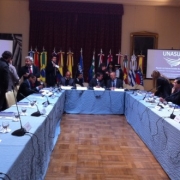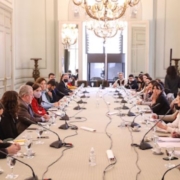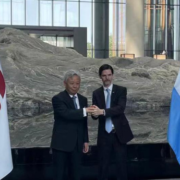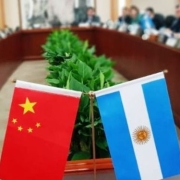Argentina getting closer to the BRICS?
After receiving the support of the Chinese and Indian foreign ministers, Argentina is getting closer to becoming a member of the BRICS group – made up of Brazil, Russia, India, China, and South Africa. For Argentina it could represent an opportunity taking into account the current situation in which our country finds itself in terms of external restrictions and financing deficit. However, it is also worth questioning what other implications this union could bring about.
“Below, we offer a google translate version of the original article in Spanish. This translation may not be accurate but serves as a general presentation of the article. For more accurate information, please switch to the Spanish version of the website. In addition, feel free to directly contact in English the person mentioned at the bottom of this article with regards to this topic”.
On July 8, Argentina took another step towards its rapprochement as a full member of the BRICS group; The event took place after Chinese Foreign Minister Wang Yi confirmed China’s support for Argentina to join the bloc. The meeting between the representatives of both countries took place in Bali, Indonesia, where the G20 Foreign Ministers meeting took place. In it, Foreign Minister Santiago Cafiero showed his interest in approaching the BRICS, highlighting the need to deepen multilateralism to accelerate the conclusion of agreements that are beneficial both for the region and for our country. Currently, the rotating presidency of the group is in charge of China, so its support and commitment to those countries that intend to join the bloc is essential. More recently, during his visit to Argentina, the Indian foreign minister, Subrahmanyam Jaishankar, ratified his support for Argentina’s advance towards the bloc. For Argentina, the incorporation into a group of such magnitudes represents a very tempting opportunity in view of the search for new commercial partners. But, what are the BRICS, and what would joining them mean for Argentina?
The term refers to the block made up of Brazil, Russia, India, China and South Africa. Headquartered in Brasilia, these countries have been advocating common development for eighteen years, consolidating themselves as a relevant multilateral and strategic space that represents approximately half of the planet’s population and almost a quarter of the global economy. With a prominent role on the world stage, they seek to promote a new financial, economic and commercial architecture through different instruments such as, for example, international investment banks, among which we can highlight the New Development Bank (BDN) and the Contingency Reserves Agreement (ARC).
As an alternative to the conditionalities imposed by the Bretton Woods institutions, the New Development Bank offers better financing conditions for key infrastructure projects based on the principles of non-interference. In this sense, the BRICS countries reflect the growing influence of emerging economies worldwide, proposing themselves as an increasingly influential and alternative space to Western forces. However, we cannot fail to point out that each alternative and form of financing has its own advantages and complications. While the traditional Western proposals have greater restrictions, they are also characterized by being relatively more transparent and having relatively more robust regulatory and accountability frameworks. On the contrary, new alternatives can represent good sources of financing with fewer restrictions but with a great lack of transparency and accountability. As a consequence, the options should not be conceived as mutually exclusive, but rather as complementary.
Argentina sees the possibility of joining the BRICS as an opportunity to promote development and well-being, in addition to functioning as a channel for growing multilateralism and the reconfiguration of the world order. As it is a South-South cooperation platform made up of emerging economies, it could mean for our country a more equitable space for cooperation with greater margins of autonomy.
It is also important to highlight the role played by Argentina’s main trading partners: China and Brazil. During the last twenty years, China has gained an economic presence in the region, showing increasing interest in establishing new strategic associations with countries such as Brazil, Peru or Venezuela. Although it is not the first time that our country has turned its gaze towards new alternatives, it is essential to consider the consequences that could be triggered by such an association. They could be of an economic nature, since a reprimarization of the Argentine economy would be encouraged, or else, of a geopolitical nature, by generating greater tensions with Western partners such as the United States. For its part, the bloc is willing to work to open a path towards an international community characterized by dialogue, for which systemic rupture would be kept away.
In terms of foreign trade, the BRICS bring together 30% of Argentine exports, and provide 45% of our imports, so if the incorporation materializes, it would mean the possibility of obtaining financing and assistance for key projects. On the other hand, the transfer of knowledge in technology and innovation could also be encouraged, which would guarantee a shared cooperation that guarantees inclusion and similar visions.
In this way, it can be argued that being parte of the BRICS could represent a great opportunity for Argentina to strengthen ties with one of the blocks that has been gaining relevance at the international level and that, in addition, brings together two of the greatest powers in the world and with whom it maintains a bond of strategic character. However, the possible implications of such an association should not be overlooked, as well as the consideration that Argentina’s accession process to the BRICS must have the approval of all its member states, for which it may give rise to a procedure slow and extensive. In short, will Argentina be able to consolidate its entry into one of the groups with the greatest economic and geopolitical weight? And in that case, what will be in store for the country to be part of said bloc?
More information
- Argentina pidió formalmente su ingreso a los BRICS – TV Pública
- Argentina consiguió el respaldo de China para ingresar a los BRICS – Ministerio de Relaciones Exteriores, Comercio Internacional y Culto
- India apoya el ingreso de Argentina a los BRICS – Ministerio de Relaciones Exteriores, Comercio Internacional y Culto
- Análisis del Nuevo Banco de Desarrollo de los BRICS – Fundeps
Authors
Camila Busso
Candela Jauregui
Contact
Gonzalo Roza, gon.roza@fundeps.org









